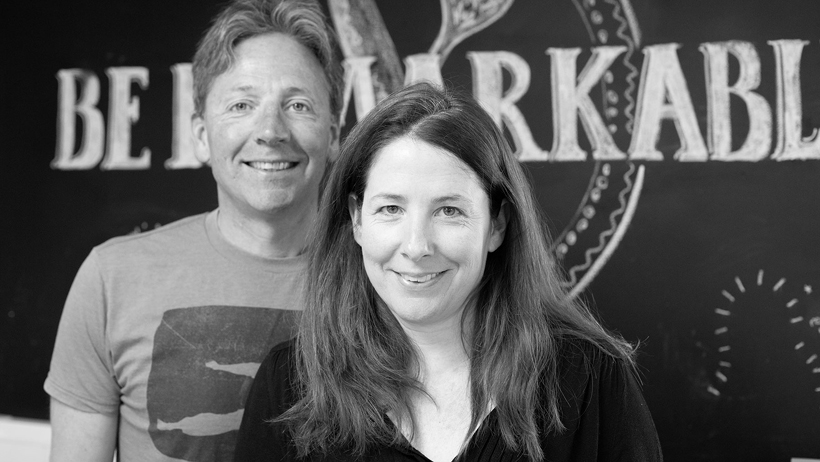Climate Impact Update
Posted on 7 May 2019
Here’s a summary of our progress, big challenges and next steps with regards to the Climate Crisis. We will continue to publish the full details of our impact on the environment each year in our Purpose Progress Report. The next one is due in a few months. Scroll to the bottom to see a letter from Ed and Rosie, our co-CEOs, regarding what COOK stands for when it comes to the Climate Crisis.
Carbon
Progress
- 18 months ago we switched to 100% renewable electricity in all our kitchens and shops, cutting our carbon footprint by around 50%.
- We can now accurately measure our direct carbon emissions – essential for measuring our progress.
- Introducing heat capture technology at the COOK Kitchen, harnessing the heat given off from our refrigeration to heat our water.
Challenges
- Cutting emissions from the gas we use for cooking.
- Cutting our diesel emissions from transporting our food.
- Reducing our current level of carbon emissions as we grow (which is, roughly, by 10% a year).
Next steps
- Working with the Carbon Trust to set Science Based Targets for our direct carbon emissions to keep us in line with limiting global warming in line with agreed targets (currently below 2 degrees) and …
- … figuring out exactly how we’ll hit these (which is the tough part).
- Hoping to lease the roof of our new kitchen in Sittingbourne to a community solar energy project.
Plastic
Progress
- We’ve moved our kids meals from black plastic trays into easily-recycled cardboard ones (with side dishes following imminently and our two-portion meals changing over this summer).
- Visits this year to tray manufacturers in Holland and Finland to truly understand the impact and see developments first-hand.
- Reducing single-use plastic in shops (like the tasting pots) and our kitchens (like the boxes ingredients such as fish is supplied in).
Challenges
- Technology in this area is changing very fast – keeping track of what is really best for the environment is a challenge.
- Our new cardboard trays have a thin plastic layer to make them food safe. Since we started using them it has been annouced that they will no longer be easily recyclable in two years’ time. Also, these trays are not strong enough for our four or eight-portion meals.
- Currently there is no alternative to the non-recyclable plastic film used to seal the trays.
Next steps
- We will soon be trialling a newly-developed coloured plastic tray for four-portion meals that’s made from 85% recycled material and is fully recyclable.
- Working with and supporting our tray and film manufacturers on longer-term sustainable solutions.
- Further reducing ‘behind-the-scenes’ plastic from our shops, kitchens and office.
Waste
Progress
- We are now zero waste to landfill at our kitchens, head office, and logistics centre.
- Food waste at the COOK Kitchen has been cut by 10% in the past year.
- All our leftover food is used to make energy through anaerobic digestion.
Challenges
- Hitting our target to cut food waste by 50% by the end of 2020.
- Increasing recycling across the business, especially in our shops (where recycling differs from council to council).
Next steps
- Targeting 25% food waste reduction at the COOK Kitchen this financial year.
- Developing more ways to redistribute surplus food and ingredients.
- Increasing recycling rates at the COOK Kitchen.
Food
Progress
- Sales of meat-free meals, which have a far smaller carbon footprint than meat alternatives, have grown to 16.5% of our total savoury sales in the past year (well ahead of our 10% target).
- Working with more local suppliers for key ingredients (eg potatoes and rapeseed oil) to cut down on food miles.
Challenges
- Better understanding our indirect carbon footprint and environmental impact through our supply chain (i.e. farmers and ingredient suppliers).
- Bringing our customers with us on our journey – we need your help to achieve all these, but we don’t want to be preachy!
Next steps
- Aiming to grow our meat-free sales by a further 2.5% compared to last year during our campaign in May.
- Exploring “scope three” Science-Based Targets for carbon reduction throughout the lifecycle of our products.
- Developing a clear expectation on the environmental performance of our ingredients (including palm oil, which we don’t use directly but it is found as a sub-ingredient in other store cupboard ingredients we use).
Hello,
We’ve been having some big conversations internally at COOK about climate change in recent weeks and want to make it much clearer what we stand for and, crucially, what we are doing about it. We believe urgent action is needed to tackle climate change, from governments down to individuals. We know COOK is part of a food system that’s contributing to climate breakdown and we’re committed to helping change it for the better.
Some may say it’s hypocritical to write about the climate crisis, given our imperfections. We hope that by acknowledging our own faults, and working on them, we can reassure others that they don’t have to be perfect either. What’s vital is that we all start to change.
We’ve managed to halve our carbon footprint at COOK in the past 18 months by switching to renewable electricity. We’re also focusing on more sustainable packaging, cutting our food waste and better understanding the full environmental impact of our food. Are we committed to doing more? Absolutely. Is it enough? Not yet.
We’ve put together a summary of our progress, big challenges and next steps above.
Thanks for reading.
Ed & Rosie
Co-CEOs
















